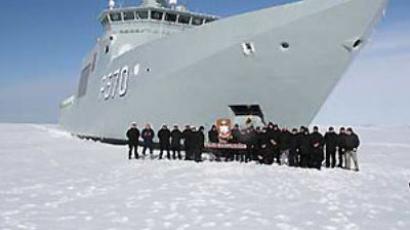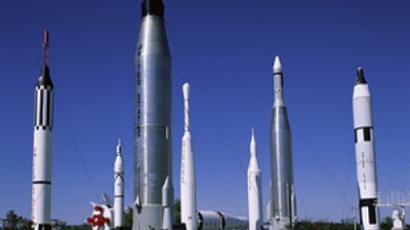ROAR: Russia, NATO continue “constructive and cool” dialogue

Moscow and the North Atlantic Alliance are preparing an agreement that will allow Russian specialists to service Soviet-era military equipment.
Russia’s ambassador to NATO Dmitry Rogozin said on November 26 that Moscow and the Western alliance are ready to cooperate in the military sphere. He stated that Russia and NATO have completely ended the confrontation caused by the events in the Caucasus in 2008. The military cooperation may resume in December, after the visit of NATO Secretary General Anders Fogh Rasmussen to Russia.
He also told the Russian media that a landmark agreement is being prepared that will allow Russian specialists to service the military equipment that Afghanistan and former socialist states of Eastern Europe had received from the Soviet Union during the Cold War.
Kommersant newspaper quoted a source at Russia’s arms exporter Rosoboronexport as saying that the agreement should “specify all Soviet military equipment models” that could be serviced. At the same time, the question still remains “whether NATO is willing to do this,” the source said.
NATO countries are not the only ones that operate Soviet military equipment, the source told the paper, adding that Afghanistan still uses “our helicopters.” If the agreement is signed, the countries that possess the equipment will not have “to require the consent of NATO leaders” to invite Russian specialists.
It is not clear, however, when the agreement can be signed. The paper wrote that it could be done next year.
Secretary General Anders Fogh Rasmussen is expected to visit Russia in mid-December. Some Russian analysts do not expect quick results in military cooperation between the alliance and Moscow. Writing in Kommersant, Ruslan Pukhov, editor-in-chief of Moscow Defense Brief magazine, said that NATO-Russia relations have not become strained recently because “they have never been normal in the whole post-Soviet period.”
NATO’s mission is to “restrain Russia” and the alliance’s main goal now is “military protection of its European members, including the new ones, from Russia,” the analyst said. At the same time, Moscow and NATO have “certain common interests,” Pukhov said. Among them are fighting terrorism, stabilizing Afghanistan and mutual trust measures. But the cooperative projects “should not be overestimated,” the analyst stressed.
As for Afghanistan, this country is “on the margin of Russia’s political interests,” Pukhov believes. The question remains if Russia would benefit from NATO’s complete victory in Afghanistan, he added.
The Russian media also commented on Polish Defense Minister Bogdan Klich’s statements about the alleged NATO plans on defending Poland “in case of Russian assault.” Klich believes that, after the Russian-Belarusian military exercises Zapad-2009 close to the Polish border in September, the plans to defend Poland have become more relevant.”
Rogozin noted that no Polish minister had recognized the existence of such a plan and asked the alliance to brief Moscow on their intentions “to repel Russian aggression against Poland.”
Observers doubt that the NATO plan really exists, Gazeta daily said. But even if this is true, analysts think that “nobody in Brussels is preparing for a war against Russia,” the paper added.
There is no problem if NATO has this plan, Colonel Vitaly Shlykov, a member of a Public Council under the Russian Defense Ministry, said. The military alliances are created just to defend the countries against an aggression, he told the daily. “Doing so, they should consider different scenarios, including the most incredible ones,” he said.
“Warsaw, for historical reasons, considers Moscow the main threat to its security,” Shlykov said. “It is possible to assume that, by joining NATO, Poland demanded some additional guarantees for itself,” he added. “For example, a special plan to repel Russian aggression. But this does not mean that anybody in Brussels takes the idea of war with Russia seriously.”
General Director of the Center for Political Information Aleksey Mukhin explains that the Klich statement is due to the disappointment of “the Polish military and industrial complex” by the United States’ decision not to deploy its missile defense in Europe. They expected big funds from the US to improve Poland’s military infrastructure, he told RBC daily. Now they are seeking funds “on an alternative project,” he said.
Aleksandr Shatilov, deputy head of the Center for Political Conjuncture, believes that the leak from the Polish Defense Ministry about the alleged NATO plans might be simply one of the means “to exert pressure on Russia on the eve of bilateral talks on the gas problem.”
After the US scrapped the plans to deploy elements of missile defense in Europe, Poland “feels deceived” and is trying “to receive some compensation,” he said. That is why Warsaw stressed the existence of the alleged “imperial plans of the Eastern neighbor” and is positioning itself as “Europe’s shield,” he added.
At the same time, Shatilov does not rule out that the NATO plans mentioned by Klich exist as “hypothetical schemes.” But, as Cold War history shows, such projects are precautionary and have no practical relation to real issues of military and political cooperation, he said.
The analyst also described Russia-NATO relations as “constructive” but “cool.”
“Each side has no clear reasons to be discontented with the other, especially after the process of integration of Ukraine and Georgia to the alliance was ended, but objective contradictions still remain,” Shatilov said.
Meanwhile, Russia and NATO are now busy preparing for the first formal meeting of their joint council since August 2008 at the foreign ministers’ level. The informal meeting of the Russia-NATO council took place in June.
In December, the road map for further development of cooperation between Russia and NATO may be discussed. In addition, “a unique situation is [now] developing to build a new approach to the security policy in the Euro-Atlantic space,” Rosbalt news agency said.
Russian President Dmitry Medvedev stressed the need for a new system of European security in summer 2008 and proposed concluding a binding agreement. The new system should be guaranteed by all states of the continent, and “no organization should have a monopoly in the security sphere, which NATO now de facto possesses,” the agency said.
The US, NATO and new member states of the EU are most skeptical about Moscow’s idea of the new security system, Viktor Mizin of Moscow State Institute of International Relations told Rosbalt.
Russia is opposing the alliance’s enlargement to the East, and the most realistic idea would be to develop the document “containing the comparison of different approaches of Moscow and the West to security in Europe,” the analyst said.
Sergey Borisov, RT














